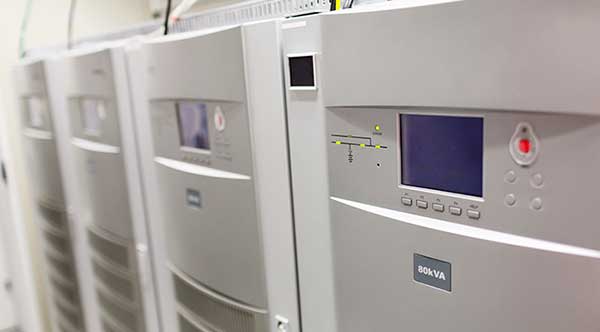
How UPS Systems Protect Your Bottom Line
On a recent maintenance service visit, a client asked us, “What do I need this UPS system for, anyway? We already have a generator.”
If you’re unfamiliar with UPS systems, this is a logical question. What does a business really need a UPS for if they have a generator that will kick on if there’s a power outage? For any organization with mission-critical power needs, a UPS not only provides an uninterruptible power supply, but several other important functions that protect your short-term and long-term operations.
What does a UPS system actually do?
A UPS (uninterruptible power supply) system has two main functions: provide seamless power in the event of a power outage and condition incoming utility power so that UPS supported equipment has a clean, stable power source.
1) A UPS provides a seamless supply of power.
Most companies know that having a UPS system provides continuous power in the event of a power failure, but its function is different than what a generator might provide. When utility power fails, a generator comes online – but can take 10 to 15 seconds to start, stabilize and begin to provide a usable source of power. Alternately, a UPS system is always online, providing uninterruptible power until the generator can take over. In instances where there is no generator, a UPS with a longer run time can supply power long enough to shut down critical equipment safely.
For sensitive operations such as hospital facilities and data centers, even 15 seconds of downtime can be catastrophic. For other businesses, a UPS system’s power features provide seamless power that prevents negative impacts on your business.
A UPS system serves as the battery for your operations, much like a battery in a laptop, for example. When you take the battery out of a laptop, a computer shuts down immediately. After it’s replaced, you wait for it to reboot and hope that any unsaved work will be recovered. If you had the battery installed and then unplugged your laptop from a power cord, your computer won’t experience an interruption. This is how a UPS system provides backup power to your facility.
2) A UPS conditions incoming utility power so your equipment has access to clean, stable power.
A lesser-known function of a UPS is the regulation of incoming power quality. Utility power is not always clean and without transients, In addition, many power anomalies are often caused by equipment within the customer’s own facility. A UPS system conditions the power by passing it through a rectifier, which converts AC current to DC current, which UPS batteries require. The battery is the heart of your UPS system. Should your facility experience a utility power failure, your mission-critical equipment will depend on your UPS’s battery system to support the load.
UPS batteries also provide a stable voltage for operations. If utility power fails or voltage drops, UPS battery voltage remains steady, and uses an inverter to convert DC power back to AC power and creating a stable current for sensitive equipment. (This is one reason why UPS battery maintenance is so important. Battery failure is the top cause of UPS downtime.)
How critical are these two functions of a UPS system?
To understand how important these two functions are, let’s look at how a UPS system protects your business from common outside factors.

- Power failure – A total loss of utility power.
- Power sag – Short-term low voltage.
- Power surge (spike) – A short-term high voltage more than 110% normal voltage.
- Under-voltage (brownout) – Reduced-line voltage for an extended period of a few minutes to a few days. This often happens during the summer months when people set their air conditioners higher than normal.
- Over-voltage – An extended period of increased line voltage for a few minutes up to a few days.
- Electrical line noise – A high power frequency power wave caused by radio frequency interference (RFI) or electromagnetic interference (EMI).
- Frequency variation – A loss of stability in the power supply’s normal frequency of 50 or 60 Hz.
- Switching transient – Instantaneous under-voltage in a matter of nanoseconds.
- Harmonic distortion – The distortion of a normal power wave, often transmitted by unequal loads.
If a company has a UPS in place, many times it is unaware these anomalies are occurring because the UPS’s ability to provide stable power mitigates the effects automatically.
UPS systems prevent premature equipment failure by continuously providing a reliable, quality power source. For organizations that don’t have a UPS, even slight variances in utility power quality put an unnecessary strain on equipment, causing them to fail sooner than expected and requiring more frequent replacement. A UPS creates a long-term cost savings by preventing “dirty” power voltages from wearing down computers and machinery. And with an aging power grid that isn’t consistently maintained nationally, that consideration is more important than ever.
Which businesses really need a UPS system?
For companies where any interruption in power is an emergency, such as a surgical facility or 911 call center, the need for a UPS is clear. But for other businesses, it’s important to conduct a downtime cost analysis to understand the financial impact every minute a power outage can have. QPS offers a free downtime cost calculator to help. Download it here.
In addition to any lost productivity or product losses a sudden shutdown would cause, there are other factors to take into account, such as reputation and customer satisfaction. Consider this scenario: a grocery store without a UPS backup system in place experiences a power outage.
Here’s a few of the potential impacts that outage causes:
- Automatic doors fail, creating unease among shoppers.
- Cash registers go offline, preventing checkout and causing customers to abandon their shopping carts.
- Customers leave the store. They potentially go to a nearby supermarket, causing the grocery store to lose a sale or worse, permanently lose those customers to a competitor.
The domino effect of a power outage creates an untold number of issues that impact your bottom line and your reputation.
Knowing the benefits of UPS system gives your team the confidence of being prepared.
Understanding the full benefits of a UPS system gives you the confidence of knowing that you’re doing all you can to eliminate the risks of power disruption. Don’t have a UPS system? Complete a downtime cost analysis, consider the unique consequences of an outage to your business, and reach out to a qualified vendor if you have questions about your company’s power backup needs.
Published on Feb 03 2016